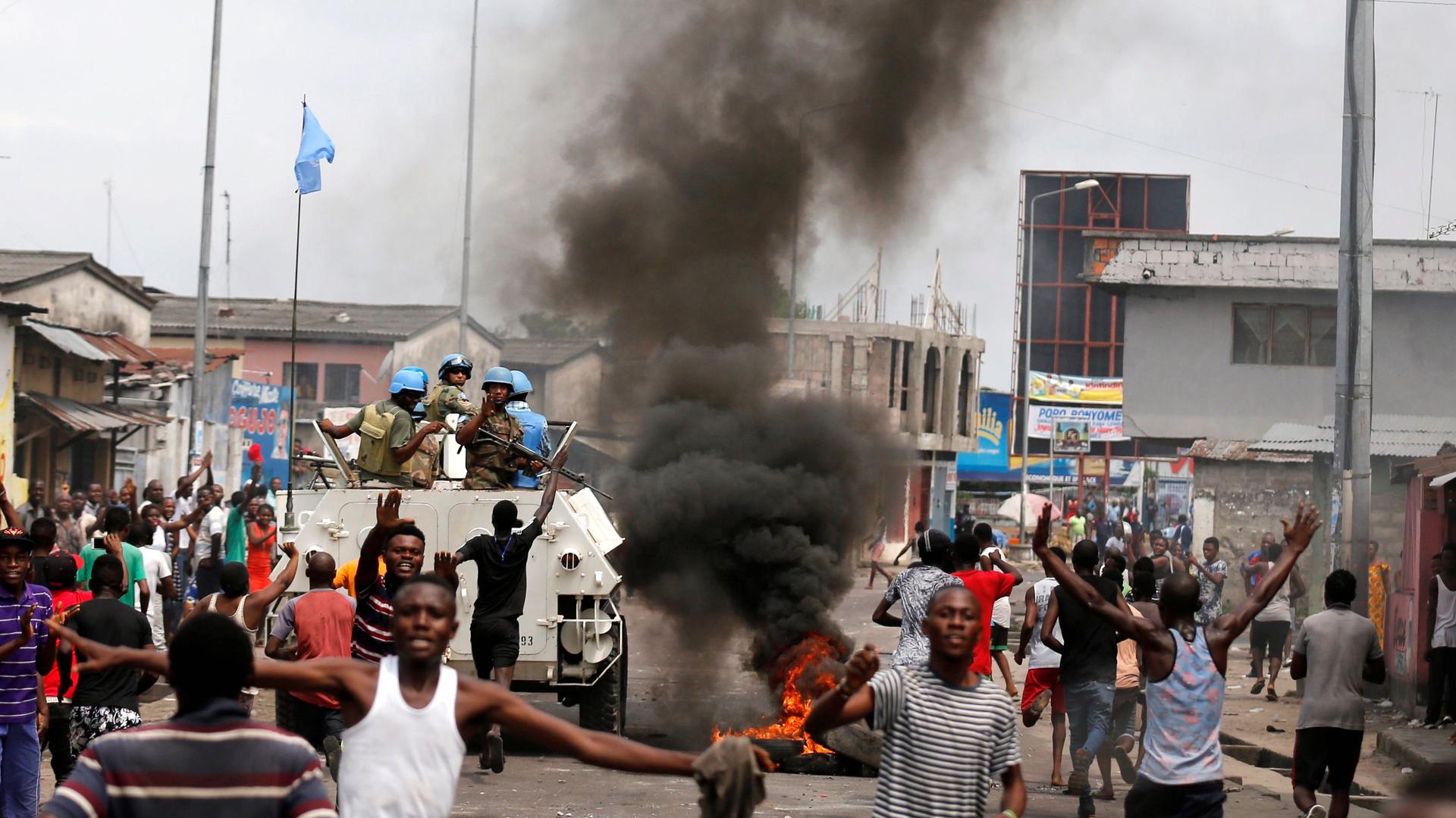In the DR Congo, protests turn deadly; president refuses to leave office
Residents chant slogans against Congolese President Joseph Kabila as peacekeepers serving in the United Nations Organization Stabilization Mission in the Democratic Republic of the Congo patrol during demonstrations in the streets of the Democratic Republic of Congo's capital Kinshasa, on Dec. 20, 2016.
At least 11 people died as gunfire erupted during protests in the Democratic Republic of Congo against longtime President Joseph Kabila, who is refusing to leave office as his mandate ends.
Shots rang out in the capital Kinshasa, where at least nine people were killed, and there was sustained gunfire in the country's second-largest city, Lubumbashi, where two died — including a policeman who was lynched by an angry crowd.
In central Kananga, the sound of heavy weapons sent crowds of panicked residents pouring into the streets, but there were no reports of clashes in northeastern Kisangani or in Bukavu in the country's east.
The UN's large DR Congo mission, MONUSCO, said it was probing reliable reports of dozens of deaths and voiced alarm over the arrests of 113 opposition leaders and civil society activists in just four days.
Tension has been mounting for months in DR Congo ahead of the Dec. 20 deadline for Kabila's second and final term in office to end.
With no election planned and no sign of him stepping down, veteran opposition leader Etienne Tshisekedi issued a plea to the country's 70 million people to "peacefully resist" and "reject" the Kabila regime.
Plumes of smoke from burning barricades hung over Kinshasa after overnight protests, and activity ground to a halt as troop carriers patrolled the largely empty streets of the megacity of 10 million.
An AFP correspondent said the streets of Lubumbashi's Matuba neighborhood were strewn with rocks and burnt tires early Tuesday amid a heavy police presence.
Local authorities said "police were forced to fire into the air to disperse civilians" because some protesters were armed. It was impossible to immediately verify that claim.
'Teargas and gunfire'
"Fortunately, we are not back to the slaughter of September," said national police spokesman Pierre-Rombaut Mwanamputu, referring to bloodshed in September when at least 53 anti-Kabila protesters died in two days, according to the UN.
Kabila, 45, who has ruled since 2001, is constitutionally barred from seeking a third term but under a controversial recent constitutional court order, he may stay on until a successor is chosen.
As the clock counted down on Tuesday's end-of-mandate deadline, crowds gathered before midnight Monday to blow whistles and beat on improvised drums, calling on Kabila to quit.
"There was teargas and gunfire," said Andre, a resident of Kinshasa's Matete neighborhood, adding that security forces "threatened the population."
And in what Kabila's opponents dubbed "a provocation," state TV overnight announced a new government.
Headed by Samy Badibanga, it is part of an October deal between the ruling party and tiny fringe opposition groups that enables Kabila to remain in office, pending elections in April 2018.
But the main opposition bloc rejects the plan.
'Caving in to pressure'
In a YouTube video released during the night, opposition leader Tshisekedi launched "a solemn appeal to the Congolese people to no longer recognize the authority of Mr. Joseph Kabila, to the international community to no longer deal with Joseph Kabila in the name of the Democratic Republic of Congo."
The 84-year-old urged people "to peacefully resist the coup d'etat."
The message was not available in DR Congo where authorities have since Sunday imposed strict controls on the flow of pictures and video on social media networks.
Tshisekedi said he hoped to continue talks launched by the Catholic Church last week to find a peaceful solution to the crisis. The talks are due to resume on Wednesday.
The opposition wants elections next year — along with a pledge that Kabila will not stand.
Badibanga urged people to stay "calm" and security forces "to show discipline and restraint" as violence erupted after his controversial appointment.
DR Congo has never witnessed a democratic transfer of power following polls since independence from Belgium in 1960.
The president has been in office since his father Laurent Kabila's assassination in 2001. He was elected in 2006, and again in 2011.
Some two decades ago, Congo collapsed into the deadliest conflict in modern African history. Its two wars in the late 1990s and early 2000s dragged in at least six African armies and left more than 3 million dead.
The article you just read is free because dedicated readers and listeners like you chose to support our nonprofit newsroom. Our team works tirelessly to ensure you hear the latest in international, human-centered reporting every weekday. But our work would not be possible without you. We need your help.
Make a gift today to help us reach our $25,000 goal and keep The World going strong. Every gift will get us one step closer.
